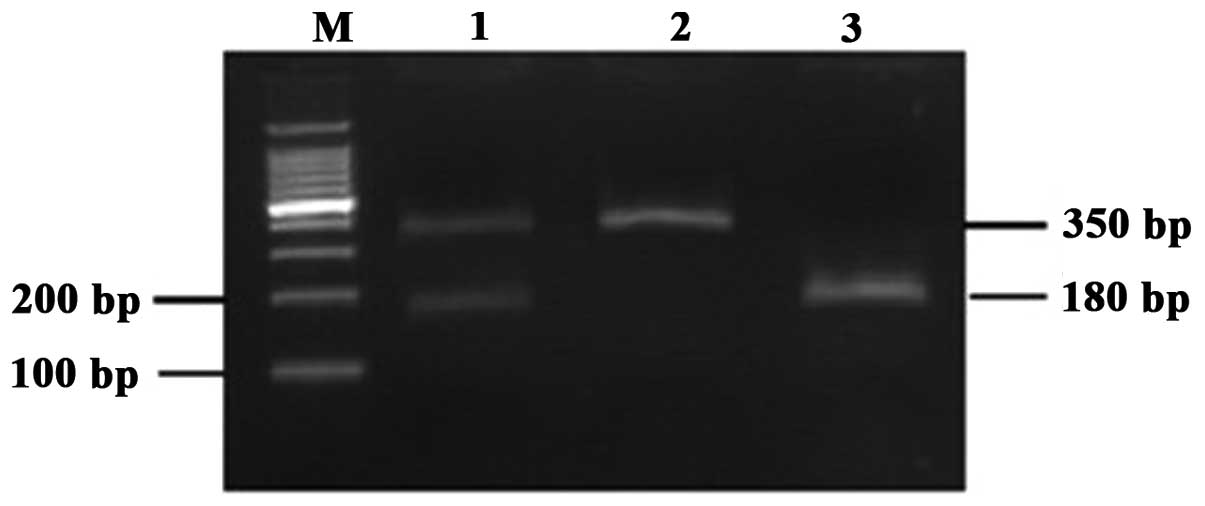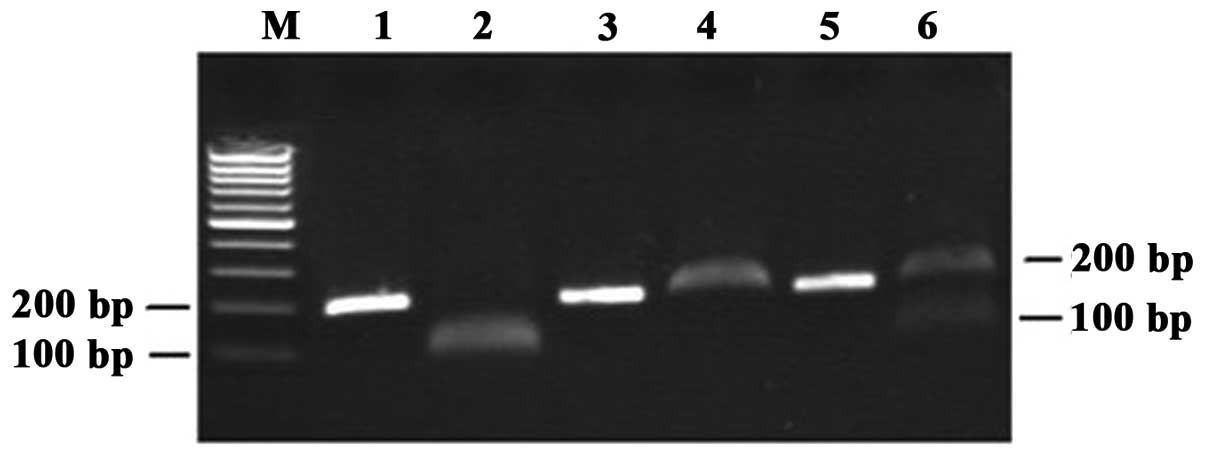|
1
|
Jemal A, Siegel R, Ward E, Hao Y, Xu J,
Murray T and Thun MJ: Cancer statistics, 2008. CA Cancer J Clin.
58:71–96. 2008. View Article : Google Scholar
|
|
2
|
McCracken M, Olsen M, Chen MS Jr, Jemal A,
Thun M, Cokkinides V, Deapen D and Ward E: Cancer incidence,
mortality, and associated risk factors among Asian Americans of
Chinese, Filipino, Vietnamese, Korean, and Japanese ethnicities. CA
Cancer J Clin. 57:190–205. 2007. View Article : Google Scholar : PubMed/NCBI
|
|
3
|
Pienta KJ and Esper PS: Risk factors for
prostate cancer. Ann Intern Med. 118:793–803. 1993. View Article : Google Scholar : PubMed/NCBI
|
|
4
|
Chan JM, Holick CN, Leitzmann MF, et al:
Diet after diagnosis and the risk of prostate cancer progression,
recurrence, and death (United States). Cancer Causes Control.
17:199–208. 2006. View Article : Google Scholar : PubMed/NCBI
|
|
5
|
Vogel U, Olsen A, Wallin H, Overvad K,
Tjonneland A and Nexo BA: Effect of polymorphisms in XPD, RAI,
ASE-1 and ERCC1 on the risk of basal cell carcinoma among
Caucasians after age 50. Cancer Detect Prev. 29:209–214. 2005.
View Article : Google Scholar : PubMed/NCBI
|
|
6
|
Thompson LH and West MG: XRCC1 keeps DNA
from getting stranded. Mutat Res. 459:1–18. 2000. View Article : Google Scholar : PubMed/NCBI
|
|
7
|
Sancar A and Tang MS: Nucleotide excision
repair. Photochem Photobiol. 57:905–921. 1993. View Article : Google Scholar
|
|
8
|
Ishikawa T, Zhang SS, Qin X, et al: DNA
repair and cancer: lessons from mutant mouse models. Cancer Sci.
95:112–117. 1993. View Article : Google Scholar
|
|
9
|
Terry MB, Gammon MD, Zhang FF, Eng SM,
Sagiv SK, Paykin AB, Wang Q, Hayes S, Teitelbaum SL, Neugut AI and
Santella RM: Polymorphism in the DNA repair gene XPD, polycyclic
aromatic hydrocarbon-DNA adducts, cigarette smoking, and breast
cancer risk. Cancer Epidemiol Biomarkers Prev. 13:2053–2058.
2004.PubMed/NCBI
|
|
10
|
Goode EL, Ulrich CM and Potter JD:
Polymorphisms in DNA repair gene and associations with cancer risk.
Cancer Epidemiol Biomarkers Prev. 11:1513–1530. 2002.PubMed/NCBI
|
|
11
|
Xing D, Tan W and Lin D: Genetic
polymorphisms and susceptibility to esophageal cancer among Chinese
population (Review). Oncol Rep. 10:1615–1623. 2003.PubMed/NCBI
|
|
12
|
Park J, Chen L, Tockman MS, Elahi A and
Lazarus P: The human 8-oxoguanine DNA N-glycosylase 1 (hOGG1) DNA
repair enzyme and its association with lung cancer risk.
Pharmacogenetics. 14:103–109. 2004. View Article : Google Scholar : PubMed/NCBI
|
|
13
|
Kim JI, Park YJ, Kim KH, Kim JI, Song BJ,
Lee MS, Kim CN and Chang SH: hOGG1 Ser326Cys polymorphism modifies
the significance of the environmental risk factor for colon cancer.
World J Gastroenterol. 9:956–960. 2003.PubMed/NCBI
|
|
14
|
Song FJ, Zhang BL, He M, et al: Trend
analysis of the incidence of prostate cancer in Tianjin between
1981 and 2004. Zhong hua Yi Xue Za Zhi. 90:2811–2814. 2010.(In
Chinese).
|
|
15
|
Zheng SL, Sun J, Wiklund F, et al:
Cumulative association of five genetic variants with prostate
cancer. N Engl J Med. 358:910–919. 2008. View Article : Google Scholar : PubMed/NCBI
|
|
16
|
Heidenreich A, Aus G, Bolla M, et al:
Guidelines on Prostate Cancer. European Association of Urology
(EAU); Arnhem, The Netherlands: 2010
|
|
17
|
Yuan H, Niu YM, Wang RX, Li HZ and Chen N:
Association between XPD Lys751Gln polymorphism and risk of head and
neck cancer: a meta-analysis. Genet Mol Res. 22:3356–3364. 2011.
View Article : Google Scholar : PubMed/NCBI
|
|
18
|
Ding DP, Ma WL, He XF and Zhang Y: XPD
Lys751Gln polymorphism and esophageal cancer susceptibility: a
meta-analysis of case-control studies. Mol Biol Rep. 39:2533–2540.
2012. View Article : Google Scholar : PubMed/NCBI
|
|
19
|
Vogel U, Nexo BA, Tjonneland A, et al:
ERCC1, XPD and RAI mRNA levels in lymphocytes are not associated
with lung cancer risk in a prospective study of Danes. Mutat Res.
593:88–96. 2006. View Article : Google Scholar : PubMed/NCBI
|
|
20
|
Wu W, Zhang W, Qiao R, et al: Association
of XPD polymorphisms with severe toxicity in non-small cell lung
cancer patients in a Chinese population. Clin Cancer Res.
15:3889–3895. 2009. View Article : Google Scholar : PubMed/NCBI
|
|
21
|
Shao J, Gu M, Xu Z, et al: Polymorphisms
of the DNA gene XPD and risk of bladder cancer in a Southeastern
Chinese population. Cancer Genet Cytogenet. 177:30–36. 2007.
View Article : Google Scholar : PubMed/NCBI
|
|
22
|
Yin J, Liang D, Vogel U, et al: The
polymorphism of DNA repair gene ERCC2/XPD Arg156Arg and
susceptibility to breast cancer in a Chinese population. Biochem
Genet. 47:582–590. 2009. View Article : Google Scholar : PubMed/NCBI
|
|
23
|
Guan P, Huang D, Yin Z and Zhou B:
Association of the hOGG1 Ser326Cys polymorphism with increased lung
cancer susceptibility in Asians: a meta-analysis of 18 studies
including 7592 cases and 8129 controls. Asian Pac J Cancer Prev.
12:1067–1072. 2011.PubMed/NCBI
|
|
24
|
Ni M, Qiu J, He W and Wang X: The
functional Ser326Cys polymorphism in hOGG1 is associated with
gastric cancer risk: evidence from 1180 cases and 2444 controls.
Eur J Gastroenterol Hepatol. 24:683–687. 2012. View Article : Google Scholar : PubMed/NCBI
|
|
25
|
Srivastava K, Srivastava A and Mittal B:
Polymorphisms in ERCC2, MSH2, and OGG1 DNA repair genes and
gallbladder cancer risk in a population of Northern India. Cancer.
116:3160–3169. 2010. View Article : Google Scholar : PubMed/NCBI
|
|
26
|
Arizono K, Osada Y and Kuroda Y: DNA
repair gene hOGG1 codon 326 and XRCC1 codon 399 polymorphisms and
bladder cancer risk in a Japanese population. Jpn J Clin Oncol.
38:186–191. 2008. View Article : Google Scholar : PubMed/NCBI
|
|
27
|
Okasaka T, Matsuo K, Suzuki T, et al:
hOGG1 Ser326Cys polymorphism and risk of lung cancer by
histological type. J Hum Genet. 54:739–745. 2009. View Article : Google Scholar : PubMed/NCBI
|
|
28
|
Li H, Hao X and Zhang W: The hOGG1
Ser326Cys polymorphism and lung cancer risk: a meta-analysis.
Cancer Epidemiol Biomarkers Prev. 17:1739–1745. 2008. View Article : Google Scholar : PubMed/NCBI
|
|
29
|
Xu J, Zheng SL, Turner A, et al:
Associations between hOGG1 sequence variants and prostate cancer
susceptibility. Cancer Res. 62:2253–2257. 2002.PubMed/NCBI
|
|
30
|
Zhang J, Dhakal IB, Greene G, Lang NP and
Kadlubar FF: Polymorphisms in hOGG1 and XRCC1 and risk of prostate
cancer: effects modified by plasma antioxidants. Urology.
75:779–785. 2010. View Article : Google Scholar : PubMed/NCBI
|
|
31
|
Nam RK, Zhang WW, Jewett MA, et al: The
use of genetic markers to determine risk for prostate cancer at
prostate biopsy. Clin Cancer Res. 11:8391–8397. 2005. View Article : Google Scholar : PubMed/NCBI
|
|
32
|
Chen L, Elahi A, Pow-Sang J, Lazarus P and
Park J: Association between polymorphism of human oxoguanine
glycosylase 1 and risk of prostate cancer. J Urol. 170(6 Pt 1):
2471–2474. 2003. View Article : Google Scholar : PubMed/NCBI
|
















